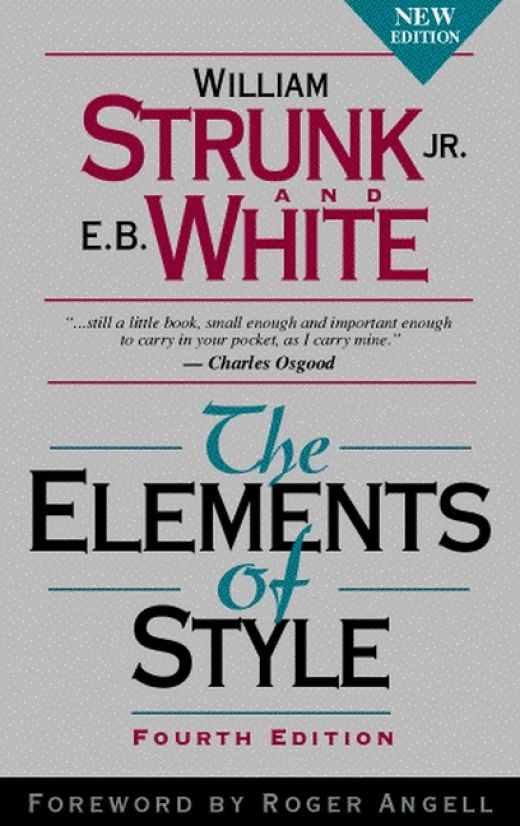No writing bible would be complete without The Elements of Style. This is the one book you hear referred to again and again by everybody whose recommendations you solicit. Writers worship this little volume.
That's half the beauty of it; it's little. Literally pocket-sized. Which makes it easy to provide it a well-deserved place on your writer's desk.
William Strunk Jr. was a professor of English at Cornell in the late 1800's and early 1900's. He developed this book as a resource for his students, and apparently would have been happy to leave it at that, but one enterprising student of his, E.B. White (of Charlotte's Web fame), saw the immense wisdom packed into the little book and decided to embellish is a bit and publish it. It has since become the most relied-upon resource for academic, fiction, and nonfiction writing.
What makes this book so essential is that it lays out logical rules very efficiently. Strunk's most famous admonition "Omit needless words" was certainly one he took to heart when he created the book. Things are laid out with a minimum of fanfare and explained clearly through illustrative examples.
This book convinced me to use the "Oxford Comma", got me using hyphens, en-dashes and em-dashes in their proper places, and cured me of my fear of the semicolon. It was this book that first taught me to "favor the specific to the general" (though that realization was greatly improved upon by the next book in this series), to "use the active voice" (don't let things be done unto your sentence subjects), and to "express coordinate ideas in similar form" (parallelism has since become one of my favorite grammatical devices). Strunk makes it easy: "Use this here. Use this like this." His way of phrasing principles as imperatives reinforces the book's authority to the point that anyone who disagrees with his rules risks crucifixion by the writing public.
White's additions to the book take a more general tack, commenting on style and method. One of his most important additions is the idea of "placing yourself in the background", an idea that lays the groundwork for what I believe is the most important principle of fiction writing: Transparency. When White tells us to "Write in a way that draws the reader's attention to the sense and substance of the writing, rather than to the mood and temper of the author", he sets this idea down in no uncertain terms.
I think a lack of transparency is the most common flaw among writers. After all, if we had no desire to be known, we wouldn't write. Most writers make the mistake of dancing like clowns in front of their reader's eyes, getting in the way of their own stories. And this attracts readers to authors about as much duckface selfies attract men to girls on Instagram. The more you gratuitously demand attention for yourself, the less likely people are to give it.
Transparency is something I'm still working hard to develop. It means deleting things that don't work, no matter how much you like them on their own merits. It means accepting the suggestions of your editors, even when they seem ridiculous or impossible. I try to take myself as far out of my writing as I can without being dishonest. One must still "write what one knows", and all that jazz, and that means the writer is still in the picture somewhere. But everything--everything--must live and die in service to the story, including one's self. Without this, your stories are just masks that you wear, and hiding behind a mask is cowardly. Writers should not be cowards. (there's a little imperative for ya!)
Next up: Sin and Syntax by Constance Hale










No comments:
Post a Comment